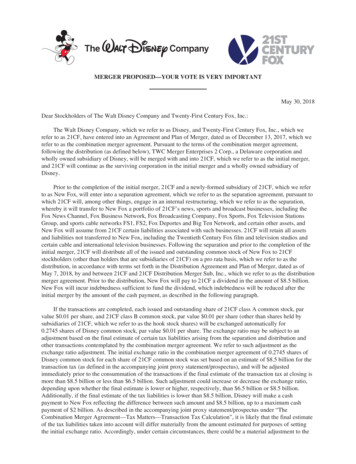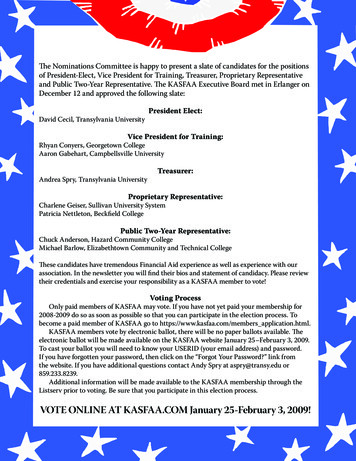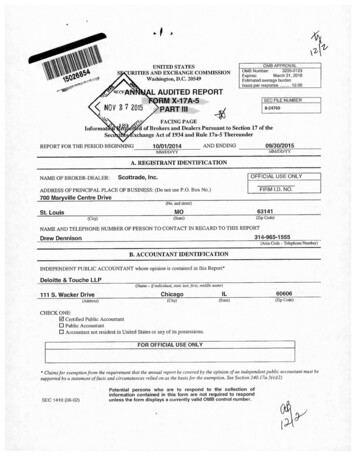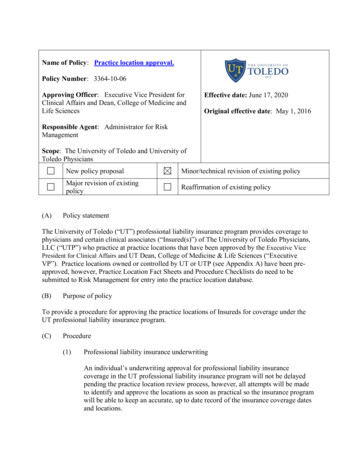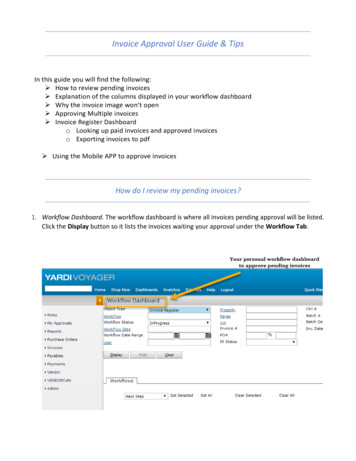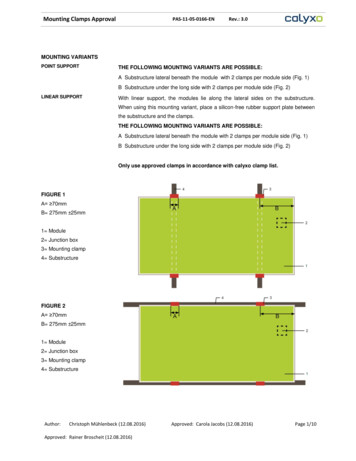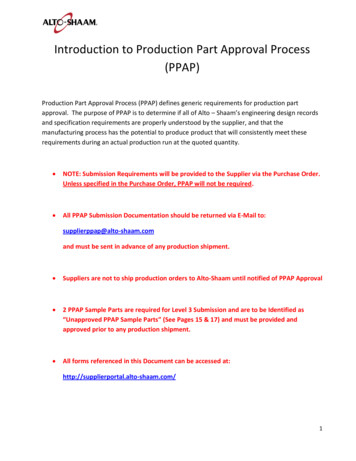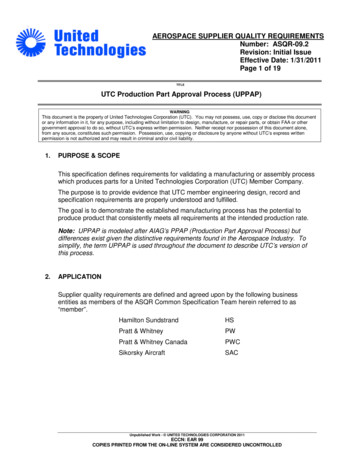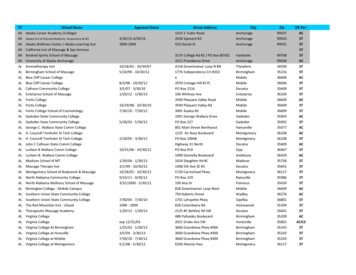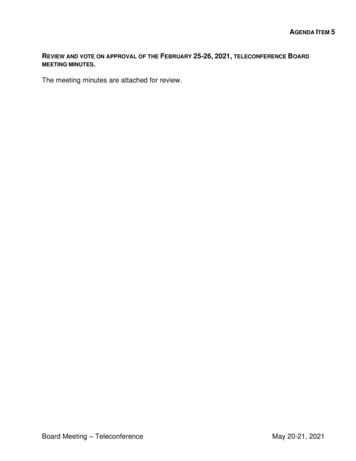
Transcription
AGENDA ITEM 5REVIEW AND VOTE ON APPROVAL OF THE FEBRUARY 25-26, 2021, TELECONFERENCE BOARDMEETING MINUTES.The meeting minutes are attached for review.Board Meeting – TeleconferenceMay 20-21, 2021
TELECONFERENCE BOARD MEETING MINUTESFebruary 25 & 26, 2021Board Member(s) PresentSharon Pavlovich – PresidentJeff Ferro – Vice PresidentBeata Morcos – SecretaryRichard Bookwalter – Board MemberLynna Do – Board MemberDenise Miller – Board MemberBoard Staff PresentHeather Martin – Executive OfficerJody Quesada – Associate AnalystHelen Geoffroy – Attorney IIIThursday, February 25, 20219:00 am - Board Meeting1. Call to order, roll call, establishment of a quorum.The meeting was called to order at 9:02 a.m., roll was called, a quorum wasestablished. All Board members were present.2. President’s Remarks – Informational only; no Board Action to be taken.President Pavlovich welcomed all in attendance and extended her gratitude to everyonewho worked so hard to ensure the meeting took place as well as the participation fromthe stakeholders.Ms. Pavlovich reported that the Occupational Therapy Association of California’s(OTAC) Western Regional Conference would be taking place March 5-7, 2021, wherethere would be exciting presentations including that of the staff from Loma Linda. Shealso expressed her excitement to see the American Occupational Therapy Association’s(AOTA) upcoming virtual conference in April 2021, where there will be over 500sessions available for professional development and continuing education.3. Board Member Remarks – Informational only; no Board Action to be taken.Vice President Jeff Ferro reported that the Department of Consumer Affairs (DCA)launched a new training system for Presidents, Vice Presidents and Committee Chairsand he found the training to be very informative and he appreciated DCA’s recognition1
that Board and Committee members were all busy professionals.Mr. Ferro reported that he was reelected as the Chair of the Cannabis AdvisoryCommittee and Vice President of the Board of Occupational Therapy.President Pavlovich congratulated Mr. Ferro.4. Public Comment Session for items not on the Agenda.President Pavlovich notified the members of the public in attendance that they werewelcome to introduce themselves at will and offer any public comments they may wantto share.Joyce Fries, Academic Fieldwork Coordinator of the Occupational Therapy AssistantProgram at Grossmont College, introduced herself and said she was happy to join themeeting.Carlin Reaume, Academic Fieldwork Coordinator for the Occupational TherapyAssistant (OTA) program at Sacramento City College and OTAC Region 5 Director,introduced herself and said it was good to be in attendance.Domenique Embrey, Academic Fieldwork Coordinator for entry level master’s and OTDprograms at Samuel Merritt University – Oakland campus, introduced herself.Chuck Wilmarth,Vice President, Health Policy and State Affairs at AOTA, introducedhimself and said he was looking forward to discussing the Licensure Compact duringthat agenda item.Akemi McNeil, Academic Fieldwork Coordinator for the Occupational Therapy programat Stanbridge University, introduced herself and said that she was glad to be inattendance.Ada Boone Hoerl, Program Director for the Occupational Therapy Assistant atSacramento City College (SCC) and COTA introduced herself and said that she washappy to attend the Board’s meeting.Jaynee Taguchi Meyer, Assistant Professor and one of the Academic FieldworkCoordinators for the Occupational Therapy Program at the University of St. Augustine,San Marcos campus, introduced herself and said that she was happy to be at themeeting.5. Review and vote on approval of the November 6, 2020, teleconference Board meetingminutes.Richard Bookwalter informed the Board of several non-technical edits and noted that hiscomments reflected on Page 5 of the draft minutes regarding his and Ms. Martin’sparticipation in the Compact Advisory group were not recorded with complete accuracy.2
Mr. Bookwalter clarified that the record should be updated to reflect the following:“Mr. Bookwalter referred to his and Ms. Martin’s participation on the OccupationalTherapy Compact Advisory Group and their concern that background checks are notrequired in all states. Mr. Bookwalter commented that he is relieved to see that abackground check has been instituted for Compact participation. He also noted that the2-year look back would capture most actionable license violations, since most statesrenew licenses every 1-2 years and would address violations older than 2 years duringthe renewal process.” Richard Bookwalter moved to adopt the November 6, 2020, minutes as amendedand authorize Board staff to make non-substantive changes.Beata Morcos seconded the motion.Public CommentThere was no public comment.Board Member VotesRichard Bookwalter: YesSharon Pavlovich:YesLynna Do:YesJeff Ferro:YesDenise Miller:YesBeata Morcos:Yes6. Update on waivers issued by the Director of Department of Consumer Affairs inresponse to the COVID-19 pandemic.Executive Officer Heather Martin reported that the waiver for continuing educationrenewal requirements was set to expire February 28, 2021, and had not yet beenupdated so she was not sure when or if it would be renewed.Ms. Martin stated that an extension to the waiver extending the limited permit expirationdate from three months to six months was submitted in December and she was happyto report that it was just approved. Board staff had begun updating the records ofaffected limited permit holders and added the good news to its Facebook, Twitter, andInstagram accounts.Ms. Martin notified the Board members that a waiver was requested to extend the 60day deadline to accept a payment for an initial license. Ms. Martin reported that thelanguage was forwarded to the Director of DCA and she was hoping to hear back soon.President Pavlovich thanked Ms. Martin for her work and expressed her gratitude thatthere was traction on these issues.Public Comment3
Joyce Fries asked how long the deadline to accept a license following approval of anapplication would be extended. Ms. Martin confirmed that it was requested to beextended from 60 to 120 days.7. Review and discussion on how the COVID-19 pandemic has affected California’s OTand OTA students’ ability to complete the fieldwork requirement.President Pavlovich thanked Board staff for the survey that was sent to all Californiaoccupational therapy and occupational therapy assistant programs regarding fieldworkchallenges during the pandemic. Ms. Pavlovich found it very interesting that there wasa number of 2020 students still in need of Level II Fieldwork placement.Regarding the AOTA Covid-19 FAQs for Educators and Students handout that statedthat “Simulations and case studies provided online do Not meet the requirements forLevel II FW”, Denise Miller reported that she recently participated in simulations whiledoing renewal work for NBCOT. She stated that it felt very intense and realistic to her,like she was with a patient in person. Ms. Miller asked if there were any discussionsbetween the educators and ACOTE surrounding simulation and telehealth.Ms. Pavlovich stated her appreciation for the documentation that AOTA provided.Public CommentChuck Wilmarth reported that simulation was allowed for Fieldwork I but not FieldworkII. Mr. Wilmarth said that it was his belief that there would be a process for the publicto weigh in about accreditation and he would share any AOTA results.Dominique Embrey said that these were desperate times and that her program had30% of its students still in need of completing their Level II Fieldwork. Ms. Embreyreported that sites are closing, practitioners are exhausted, and the next wave of OTsare needed but they are stuck in a holding pattern.Ada Boone Hoerl expressed her appreciation for the conversation and that it was herbelief that it will take a while before there is a return to normalcy. She reported thatSCC’s OTA program has students that should have graduated in December 2020 andhaven’t even had their Fieldwork I opportunity. Ms. Boone Hoerl also reported that,due to fieldwork placement challenges, SCC would not have a spring 2021 cohort.President Pavlovich thanked the members of the public for their input and stated thattheir comments were very concerning.Denise Miller stated that listening to the comments made by her professionalcolleagues brought about a public protection issue. Ms. Miller stated that this was anopportunity to reach out to OTAC and possibly AOTA so that everybody could bandtogether. Ms. Miller suggested a ‘call to action’ to help OTs and OTAs by thinkingcreatively, getting folks involved and energized.4
Vice President Jeff Ferro refreshed the topic of apprenticeship and suggestedrevisiting the discussion of implementing an opportunity of a modified way forindividuals to learn and how education is delivered.Executive Officer Heather Martin took the opportunity to thank Domenique Embrey forbeing instrumental in the development of the fieldwork questions used in the pandemicsurvey and for assisting Board staff.Public CommentAda Boone Hoerl responded with full support to Ms. Miller’s suggested ‘call to action’and collaboration with OTAC.Domenique Embrey also expressed her support for Ms. Miller’s ‘call to action’ andsuggested that the emphasis be on placement of California’s students first.Jaynee Taguchi Meyer expressed her support for coming together with OTAC andagreed with Ms. Embrey’s suggestion to focus on California students first.President Pavlovich thanked the members of the public, confirmed that she believedthis to be a consumer protection issue and supported Ms. Miller’s ‘call to action.’Executive Officer Heather Martin suggested sending a letter to work sites for a largerreach and suggested that it would be helpful if a work group was formed to assist withthe messaging.Ms. Miller suggested that a letter be tailored and sent to members of emergingpractice groups that are not connected to any type of facility.Secretary Beata Morcos expressed her support for all the comments made and theidea of outreach. Ms. Morcos stated that the focus should be on helping the studentsget their fieldwork completed, licensed and get them out into workforce. Ms. Morcosalso stated that she felt it important that alternate fieldwork settings were accepted.Richard Bookwalter commented that he was amazed that Kaiser Northern Californiacovered a quarter of the California occupational therapy workforce population, yet henoticed very few fieldwork opportunities at Kaiser. He suggested outreach includeKaiser, Sutter, and other large entities.Public CommentJoyce Fries stated her full support for the workgroup and volunteered to be a part of it.Ada Boone Hoerl stated her support of the use of emerging practice areas, that interms of a site that does not have OT services, it can still be used for Level IIfieldwork. Use of emerging practice requires establishing a system of programmaticsupervision and documentation, which is currently not an option available at SCC dueto staffing and supervision levels that would be required to stay in compliance.5
Domenique Embrey stated that she would be happy to volunteer for the workgroupand encouraged the Board to reach out to the California Fieldwork Coordinators groupwho can bring their experience to the table and right this ‘Call to Action’.Jaynee Taguchi Meyer agreed that the issue is critical and stated the importance ofappealing to burned out practitioners to let them know how even a little bit of help willsignificantly help the profession. Ms. Taguchi Meyer also suggested not only reachingout to the large entity sites like Kaiser and Sutter but to their top executives who aremaking the decisions.Akemi McNeil stated her appreciation for the comments made regarding reaching outto licensees, sites and top brass but also to put forth effort to encourage the individualOT’s to do more outreach.Denise volunteered0 to be a part of this workgroup as she has had the opportunity towork with emerging programs and hopes she can bring fresh eyes to a very oldproblem. Denise Miller moved to have the Board as a follow up to the OT/OTA surveyconsider putting together a workgroup to further address fieldwork sites, OTs,and OTAs in California and next steps.Lynna Do seconded the motion.Public CommentJoyce Fries questioned whether the word “consider” should be replaced with “create”.Denise and Lynna withdrew their motion and second respectively. Denise Miller moved to have the Board establish a volunteer workgroup toaddress the issue of fieldwork sites specific to the state of California for OTs andOTAs.Lynna Do seconded the motion.Public CommentThere was no public comment.Board Member VotesRichard Bookwalter: YesSharon Pavlovich:YesLynna Do:YesJeff Ferro:YesDenise Miller:YesBeata Morcos:Yes8. Review and discussion of various states’ legislation introduced to allow their state tobecome a member state of the Occupational Therapy Licensure Compact, to facilitatethe interstate practice of occupational therapy.6
President Sharon Pavlovich commented that the data provided under this agenda itemwas requested of Board staff at the previous meeting.Richard Bookwalter stated that the legislative data provided for various states was allpending and that it was interesting to see how each state is going about establishingtheir language.President Pavlovich added her appreciation for Georgia’s language and asked Boardstaff to track the bills and bring back any changes throughout the year.Public CommentChuck Wilmarth stated his appreciation for the agenda item and the discussion by theBoard. He informed the Board that there is a map available on OTCompact.org thatshows which states have legislative bills are pending.Mr. Wilmarth reported that issues surrounding what a compact state will pay incomparison to what the licensee will be required to pay have arisen and trial lawyershave come forward regarding immunity for the compact commission.Utah and Nebraska have raised questions regarding the need for the compact in light oftheir reciprocity laws.Virginia is the first state to have their Compact legislation pass in the House and theSenate and was sitting on the Governor’s desk. Utah’s legislation passed in the Senateand stalled in the House, Missouri had bills pending in both chambers and in OhioCompact legislation had passed the Senate.9. Review and discussion of 2020 California legislation to establish a Physical TherapyLicensure Compact and a Nurse Licensure Compact to (NLC) which would authorizethe Board of Registered Nursing and the Board of Vocational Nursing and PsychiatricTechnicians to issue multistate licenses.President Pavlovich stated that she found the provided reading interesting and asked forthoughts from her fellow Board members.Richard Bookwalter said that he found the Physical Therapy (PT) analysis interestingand some of the points raised reminded him of the points that were brought up duringOT compact discussions. Background checks were raised in the PT analyses and thecompact background check is not as strict as the California DOJ background check inplace now. Mr. Bookwalter was disinclined to take a position on these two bills sincethey are not dealing in occupational therapy.Denise Miller noted that the legislation to establish a PT and Nursing compact wasdated May 2020 and expressed her curiosity as to whether the Board members’thoughts regarding the OT compact have changed knowing that other health careboards have introduced legislation. She also posed the question whether a licensurecompact moves the Board’s agenda forward so that consumers have more access tocare and OT practitioners have additional opportunities to treat.7
Vice President Ferro stated his interest to see whether the legislators will modify thepublic safety issues that may arise.Secretary Beata Morcos expressed her concern over the passage of AB2138 andlimitations it places on regulatory entities in reviewing and applicant’s criminal history.Ms. Morcos indicated concern regarding equity in the way other states in the compactconduct their background checks.Lynna Do worried that a lower standard background check could be a detriment to theprofession. She suggested that the Board keep a close eye on the legislation and makesure that if the wording produces a lax background check that the Board should alert thepublic and ask them to reach out to their elected representatives.President Pavlovich reported that the information provided regarding the PT andNursing legislation as well as the other states with OT compact legislation widened herlens and it was very helpful. The information allowed her to believe that the OT compactsounded like a good idea. She found it interesting that PT association supported the PTcompact legislation, but the California Board of Registered Nurses opposed the nursecompact legislation in the 2020 analyses.Executive Officer Martin stated that as of this meeting Nursing Compact legislation hadbeen re-introduced but no legislation had been introduced yet for physical therapists.Public CommentChuck Wilmarth said that it's not a favorable climate for licensure compacts in Californiaand that was one of the reasons that the state Association has decided to hold off onmoving forward with OT Compact legislation. OTAC wants to wait and see whathappens to the PT and Nursing legislation. Mr. Wilmarth committed to sharing theanalyses with Dan Logsdon, Director National Center for Interstate Compacts Council ofState Governments and bring back thoughts and observations to a future meeting.10. Review and discussion of the final Occupational Therapy Licensure Compact.President Sharon Pavlovich asked the Board members for discussion or their positionon the OT Compact.Richard Bookwalter stated that since this was the final draft even if a change wassubmitted it would not be made and he did not feel the need to take a position until itbecomes relevant to California.Lynna Do agreed with Mr. Bookwalter and said that she would like to discuss it furtherwhen it’s relevant.Denise Miller agreed with Mr. Bookwalter as well and said that in light of the robustdiscussion during Agenda item 9 that she did not wish to make any further comment.Vice President Ferro and Beata Morcos had no comment.8
Public CommentChuck Wilmarth thanked the Board for their feedback and thanked Richard Bookwalterand Heather Martin for their participation on the OT Compact Advisory committee. Mr.Wilmarth stated that he would be happy to return when needed.President Pavlovich thanked Mr. Wilmarth.Executive Officer Heather Martin clarified that she was to extend an invitation to DanLogsdon following his review of the analyses from the PT and Nursing compact.Ms. Miller asked that OTAC and AOTA be invited to give their position on the OTcompact.11. Update and discussion on 2020 Chaptered bills:a. Assembly Bill (AB) 2113 (Low) Refugees, asylees, and special immigrant visaholders: professional licensing: initial licensure process.Ms. Martin clarified that AB 2113 would put in to place an expedited application reviewfor refugees, asylees and special immigrant visa holders the same as is currently inplace for military spouses. The license requirements are the same, but the applicationreview is expedited.Ms. Martin reported that the discussion of these bills was informational as they werechaptered.b. AB 2520 (Chiu) Access to medical records.President Pavlovich gave a verbal overview.c. Senate Bill (SB) 878 (Jones) Department of Consumer Affairs: license: application:processing timeframes.President Pavlovich asked Ms. Martin how the Board was doing on posting the requiredtimeframes.Ms. Martin assured Ms. Pavlovich that due to a quarterly report required of all Boardsand Bureaus that compliance would be met. The only difference being that the Boardwould be responsible for posting on its website.d. SB 1
May 20, 2021 · Joyce Fries, Academic Fieldwork Coordinator of the Occupational Therapy Assistant Program at Grossmont College, introduced herself and said she was happy to join the meeting. Carlin Reaume, Academic Fieldwork Coordinator for the Occupational Therapy Assistant (OTA) program at Sacramento City College and OTAC Region 5 Director,
